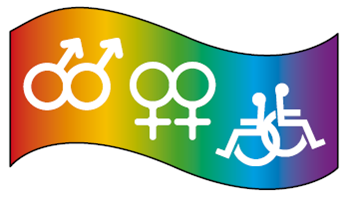Why I Study LGBTQ and Disability in Social Work

During this past summer, I was asked to give a talk at Yeshiva University’s School of Social Work, for their Common Day, on matters related to LGBTQ issues and social work practice. Instead of delivering a dry speech, I narrated a personal story of my journey to studying LGBTQ and Disability — two identities that intersect and create multiple oppressions in an individual’s life. Here is a snippet of it:
I have been involved with the LGBTQ population since the age of 16. I was tired of feeling like the outsider among my peers and community in Bensonhurst, Brooklyn. I decided to find a way to meet other LGBTQ people in the City. A friend of mine, who was also gay, said why don’t we contact one of the gay hotlines listed in the Village Voice. So, we found one, and an older gay gentlemen from the hotline said to visit the Gay and Lesbian Center in Greenwich Village. It was a scary endeavor to travel on the train all the way to the city, but worth the opportunity of finally finding people who identified proudly with being gay. When we discovered the location of the Center, my friend and I asked about groups and counselors available to gay youth. We were directed to Youth Enrichment Services, who embraced us immediately, and provided a safe space for us weekly to attend groups with other gay youth. I felt at home, finally. That was 17 years ago.
Since that time, I have made it a point to be an advocate for the LGBTQ population through my work experience and personal activities. I integrate LGBTQ and Disability literature, film and social media, in the classes that I teach. I write about the experiences, issues and concerns that surround both of these populations. And most importantly, I am mainly interested in how LGBTQ and Disability intersect as identities, and how both policy and practice should address institutional oppression.
You may ask why I chose to focus on disability; it was coincidence that a fellow social work student introduced it to me while I was graduate student in social work at NYU. I realized people who remain on the fringes of our society — I being one of those people since I am a gay and working-class — need the support, political power and financial backing of those who can challenge normativity. Normativity has been equated with the values of the dominant culture, which is usually described as wealthy men, who are able-bodied and heterosexual. That is not political. That is a reality!
As social workers, I believe our role should be to challenge the master narratives through the collection of our clients/students personal stories and to find ways to put those personal stories to use through your work. It could be utilized in the papers you write, discussed at your internships and jobs, brought to your community board, employed in qualitative research, published in books, channeled through art, expressed in social media and spread through spoken word/or other types of communication to family, friends and colleagues.
In the end, you will be happy that you maintained your integrity and commitment to your professional role. Through your efforts, those people’s voices will be heard.
You Might Like
